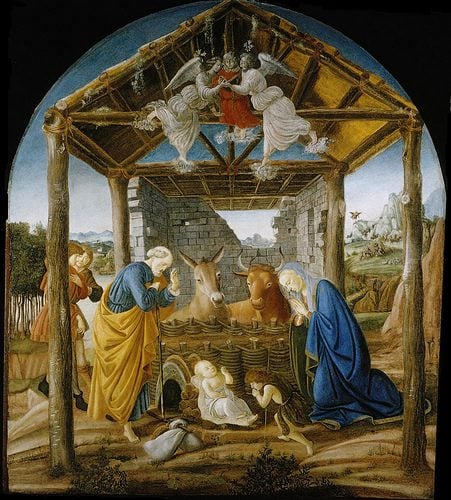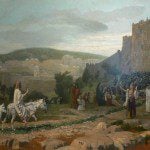
What can I possibly say here about this most familiar of stories that hasn’t been said both recently and eloquently?
Not much, probably.
Perhaps a few very quick notes will need to suffice.
Matthew 1:21 — “You shall call his name Jesus, for he will save his people from their sins.” This statement presupposes that readers understand the meaning of that name, Jesus.
The English form of the name Jesus is derived from the name Iēsous (Greek: Ἰησοῦς), which, in its turn, is the Greek form of the Hebrew name Yeshua (Hebrew: ישוע). (Compare the Old Testament name of Joshua, the successor to Moses.) Yeshua is based on the Hebrew root y-š-ʕ (ישע), meaning “to deliver,” or “to rescue.” Both the name Yeshua and its longer form, Yehoshua, had become common among Jews of the Second Temple period — i.e., at the time of Jesus. The precise meaning of the name is somewhat debated, but all of the possibilities, which center on Yah, the first syllable of the divine name Yahweh (that is, Jehovah), carry closely related meanings, including “Yah saves,” “Yah is salvation,” “Yah is a saving-cry,” and so forth.
Thus, the statement “You shall call his name Jesus, for he will save his people from their sins” makes perfect sense.
Matthew likes to explain the meaning of names. Compare his explanation of the name Emmanuel, which, he says at 1:23, “means ‘God with us.'”
He is also eager, as at verses 1:22-23, to indicate how Jesus fulfills the ancient messianic promises. This will be a recurrent theme in his gospel; it’s far less common, if it occurs at all, in the gospel of Luke.
The “manger” (Greek phatne) into which the infant Jesus is placed after his birth and his wrapping in swaddling clothes wasn’t a cute little Austrian or Bavarian cradle but, rather, a feeding trough. And it was almost certainly made of stone. (The French verb manger, from which the English word derives, means “to eat.”)
And what about the “inn” of Luke 1:7?
The Greek word kataluma, which the King James translates as inn, does indeed refer to a “lodging place.” But it might be preferable to translate it as referring to an “upper room.” It can indicate the room of a house where guests visiting from out of town might be able to lodge for the night, or even simply a dining room. According to Mark 14:14, for example, Jesus celebrated Passover — the Last Supper — with his disciples in a kataluma, an “upper room.”
In Luke 10:34, which is plainly talking about a public inn (effectively, a motel), Luke uses the quite different word pandocheion. But Bethlehem, at the beginning of the first century, was a very tiny town, It may have had a population of no more than two or three hundred people altogether. There was probably no motel or inn there.












